
20 minute read
Engineers shine at the RailStaff Awards
Paul Belle of AECOM (left) was presented with Rail Engineer of the year by Will Bryant of Colas Rail UK.
the RailStaff Awards Engineers shine at


The annual RailStaff Awards is very different from all the other rail industry awards that take place throughout the year. They recognise people, not companies, and celebrate their achievements in helping colleagues, passengers and the general public.
Of course, they all work for companies, and some even help with preparation of the entry forms, but it is still the performance of an individual or team that wins the award, not that of their employer. So that’s about the second big difference between the RailStaff Awards and others. Because individuals and teams win on a personal level, they also celebrate on a personal level. They won the award by their own hard work - it is THEIR win - and that makes success taste so much sweeter.
That’s why there is such a party atmosphere at a RailStaff Awards event. All the finalists have achieved something, and those who win or are highly commended feel pride in their achievements. The party atmosphere runs throughout the evening. From the arrival of the guests, through the look of the evening (the theme this year was Morocco), the stunning aerial performances by highly skilled acrobats and the award presentations themselves, to the dance band and fairground rides afterwards. It was once again a truly great evening.
Martin Hottass, managing director of technical training at the City & Guilds Group, summed it up: “As always, the RailStaff Awards was a brilliant occasion, to come together with different organisations from across the industry to witness how the sector celebrates its people and the vital work its unsung heroes do on a daily basis.”
Rail Engineer | Issue 181 | Jan/Feb 2020 Being industry awards, the categories are wide ranging and include human resources, diversity and inclusion, marketing and communications, station staff and customer service. However, there are a number that are aimed at rail engineers, and others such as charity or lifetime achievement that could apply to anyone.
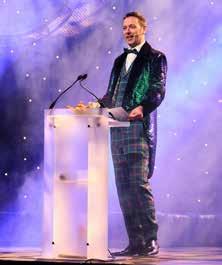
LNER’s Richard Salkeld hosted his second RailStaff Awards.
Rail Engineer of the Year
The most obvious engineering category is Rail Engineer of the Year. In 2019, 25 individuals were nominated by a total of 60 nominators. Those were displayed on the event website and the public was invited to vote on their favourite entry. A total of 6,078 votes were cast, and the resulting ‘top fifteen’ went off to the panel of judges.
The 15 finalists were from Amey Consulting (2), Network Rail (7), AECOM (2), Bombardier Transportation, Atkins (2) and Telent. Category sponsor Colas Rail UK was involved in the judging (they had no entries that would throw up a conflict of interest) as well as a couple of independent judges.
And the winner was… Paul Belle of AECOM.
Described by colleagues as a great ambassador for rail engineering, Paul is passionate about making a difference, maintains high standards in his work and, as a result, is well-respected by his team, peers and clients.
He has a great in-depth knowledge of railways, particularly multi-disciplinary integration and coordination, and combines this with good direct communication skills to overcome concerns before they become issues.
Paul led the development of the GRIP 1-3 feasibility studies for the Rail Systems Alliance South (formally S&C Alliance) in the East, achieving class-leading standards of delivery through his understanding of stakeholder requirements and applying his technical and pragmatic expertise.
In a RailStaff Awards submission, one colleague said: “I truly admire his passion and drive doing the right things, providing solid and pragmatic engineering solutions, considering all stakeholders’ interests as well as whole lifecycle of the railway engineering works.” After being presented with his award, Paul talked about his passion for rail engineering: “I always wanted to do something for the greater good, I wasn’t interested in getting a job and making money for the sake of making money, it was all about doing something for the greater good, for society.
“When I was a third-year student at Exeter University, I remember being stood on the platform at Exeter St David and everybody there was slagging off the railway. The Voyagers were coming in and they were taking away the standard HST sets. Half the train at twice the frequency, they said, but it was half the train, twice as delayed, and people were slagging engineering.
“As an engineering undergraduate, at that point I decided I am not going to have that. I had the skills so I got in the game.
“What drives me now is about leaving a legacy for the next generation. Doing the right thing for the right reasons.”


But he was keen to stress that he wouldn’t be where he is today without the help of others, adding: “I am only as good as the individuals that have invested their time into me.”
Two Atkins engineers were highly commended. Dan Reilly has worked with Atkins for five years as a system testing engineer. He has been heavily involved with the Feltham stage 0 (Shepperton) project, which involved the introduction of future signalling systems.
An entirely new approach was needed on this project, and Dan was pivotal in pulling the telecoms, systems, and signalling teams together to form an integrated and converged technology delivery team, broadening Atkins collective knowledge on electronic systems and stepping up well above his day-to-day role.
Paul Hooper, Atkins’ technical director, is well known as a railway electrification engineer, working across all regions in rail. He sits on several national industry committees and, following his promotion to technical director, the feedback noted he was able to lead the group away from challenging views to more pragmatic solutions, which mitigated risks without significant industry costs.
Civils and Infrastructure
A lot of the engineering that takes place on the railway infrastructure is civils-based, so the Civils and Infrastructure Team award is a popular one, sponsored this year by protective-clothing manufacturer Pulsar. Once again there was a wide range of finalists - Network Rail (of course), Govia Thameslink Railway, Stagecoach Supertram,
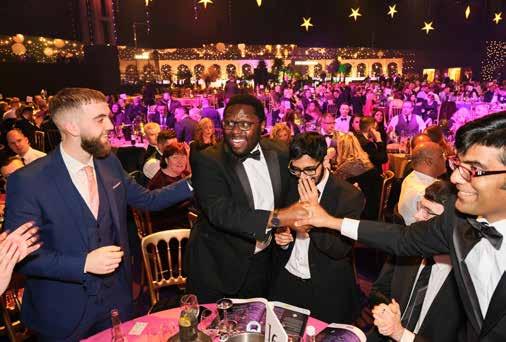

Amaro Signalling, TES 2000, Alstom, Genesee & Wyoming (née Freightliner), Colas Rail, Hitachi Rail STS and Murphy. In the event, it was the Euston team of the S&C South Alliance that won the day. This collaboration of Network Rail, Colas Rail and AECOM delivered a crucial programme of enabling works for the new HS2 terminus at Euston, ahead of the May 2019 timetable change.
Focussing on collaboration, commitment and teamwork, the team developed positive working relationships with the many stakeholders from the LNW route, train operators, third parties and the local maintainer. The core works for the programme were delivered in an area of central London where there is opposition from some residents, so mitigating against this required careful stakeholder engagement.
Throughout the project, the team made efforts to put the passenger first. This was evidenced by the team assisting in getting passengers off a stranded train in the Euston Throat when competent railway staff were required at short notice. The team also undertook litter picking, devegetation works and graffiti clearance, which kept the local community on board. Alliance spokeswoman Cate Lough, of Colas Rail, said: “It wasn’t just the work we delivered, it was everything that went into it. We were working in a really sensitive area, we went above and beyond with the local community, we changed our programme of works to affect them as little as possible while building a good relationship with the train operating company and infrastructure operator.”

Stuart Jukes, managing director of category sponsor Pulsar, added: “Everybody had worked incredibly hard, as a lot of the other entries had as well, but the S&C Alliance Team really stood out and I can’t commend them enough. “For such a small team to go out there and do it is just phenomenal.”
The five members of Network Rail’s LNE IP Signalling project construction team were highly commended for being innovative and persuasive problem solvers. They regularly challenge task methodology, particularly for weekend works, and carry out site visits in all weathers from midnight to dawn, which contributes hugely to right-time handback of weekend possessions.
Also highly commended was the team that managed the Brighton Main Line Improvement Project, an engineering programme to improve the reliability of the railway through four Victorianera railway tunnels, Haywards Heath, Patcham, Balcombe and Clayton.
Rail Engineer | Issue 181 | Jan/Feb 2020 Against a background of historic performance reliability issues on the southern part of the Brighton main line, Network Rail successfully undertook and completed an innovative nine-day engineering blockade that used a school spring half-term week to deliver the works, which would otherwise have taken 79 weekends and over two years to deliver.
Digitising or digitalising?
Although Digital Railway is no longer its own organisation within Network Rail, it is still a major activity, encompassing more than just signalling and telecommunications. This was demonstrated when the award, sponsored by digital telecommunications specialist Westermo, went to the Intelligent Infrastructure track team (pictured below).
Commencing at the start of CP6 on April 1, 2019, the Intelligent Infrastructure programme has developed a tool which looks at the infrastructure and predicts future faults so they can be fixed before they cause any delays on the railway. It has been developed in six months and is now out with customers for comment, trials and testing.
For the first time, track teams in the routes will be able to access all the information they need, from one digital source, to carry out the right work, at the right time, in the right place.
Referred to as the Track Decision Support Tool, it will shift Network Rail from century-old ‘fix on failure’ regimes to ‘predict and prevent’ regimes - allowing work to be planned ahead while also reducing speed restrictions and delays for passengers.
The team is a collaboration of Network Rail colleagues from engineering, business change and analytics disciplines working with Atkins - Network Rail’s partner and systems integrator.

Programme manager Martin Mason, of Network Rail, said: “It’s the first time in the traditional railway sense that we’ve started to use intelligent data to predict and prevent faults.
“As an industry we’ve always been very data-rich but not data-intelligent. Now we’re moving from a situation where we’re not a reactive organisation but a proactive organisation.”
Phil Mounter, transportation sales manager at Westermo, said: “Teamwork was what stood out more than anything, and collaboration, which is producing excellent results after such a short time.” Described by colleagues as knowledgeable, supportive, honest, collaborative and well respected, Trevor Wheeler of Telent Technology Services is one of the few telecoms PICOTs (Person in Charge Of Testing) in rail. During his 20- year career, Trevor has introduced several initiatives which have led to new working practices, creating both cost and time efficiencies and mitigating train delays, as well as earning him a ‘highly commended’ at the RailStaff Awards.
Also highly commended was Abdul Rehman Savant of Amey Consulting. Colleagues say that he is constantly looking at bringing the railway into the 21st century, liaising with suppliers and manufactures to develop new technologies, smart solutions and innovative ideas to help improve the railway. He organises lunchtime CPD events, not only to keep himself up to date with new digital technologies, but also to inform his colleagues from all disciplines and sectors within Amey, with whom he is always willing to share his technical knowledge of digital technologies.
Depot Staff
Not forgetting the mechanical trades, the Depot Staff award went to a Southern employee who was praised for leading the push to introduce time-saving software at some of Govia Thameslink Railway’s depots. David Mitchell took on the initiative to roll out the chat-based digital workspace Microsoft Teams at East Croydon. As a result, the level of communication and engagement between management and the team increased tenfold. The move has given staff access to information they previously had to request and has also brought the depot closer to becoming paperless.
Following the productivity uplift from the initial rollout, David spent time visiting other on-board supervisor depots to help them set up the scheme.
His enthusiasm for new technology was an important factor in teams adapting to the technology, which has transformed the way on-board supervisors work and communicate.
Workmates said they were inspired by David who not only works tirelessly for his team and takes the time to share his knowledge of the on-board supervisor role but has also found time to raise more than £1,000 for Great Ormond Street Hospital.
A former Disneyland Paris performer, David is driven by a desire to push customer service standards even higher, which was another contributory factor in his awards success.

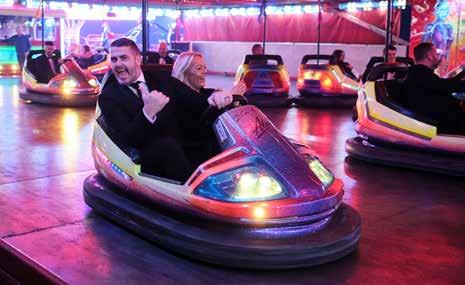
“I started off as a conductor down at Brighton for Southern and have always thought I could make a difference with my background,” he added. “Times are changing. It’s not always all about safety. It still is a massive part but people are paying £6,000 a year [on season tickets], they want to see where their money’s going. And it’s not just me, there’s a massive culture change in Southern.” Traffi, an industry-leading designer and manufacturer of PPE safety gloves, sponsored the Depot Staff Award.
Dean Cracknell, head of marketing at Traffi, said: “Traffi has strong links to the rail sector and has enjoyed keeping hands safe among wearers for 10 years. We were delighted to sponsor ‘Depot of the Year’ and hope to continue supporting the RailStaff Awards in 2020.”
Highly commended was Network Rail’s Nigel Moody, who works for Peterborough DU E&P maintenance. He and his colleagues have supported the King’s Cross re-modelling project over the last nine months, undertaking complex E&P works as short notice to ensure the project hits major milestones.
To date, Nigel and his team have saved the project in the region of £0.5 million on £0.8 million of work - 60 per cent - with all works completed safely and to an extremely high standard. Nigel’s improvements to the E&P works saved another £0.2 million.
Ian Parr was another to be highly commended by the judges. He has been depot manager of Southport TCD for just a year and a half and, in that time, he has turned the depot from the worst performing one to the best. The depot’s sickness figures for the last twelve months are the lowest in the business and its engagement scores are now the highest.
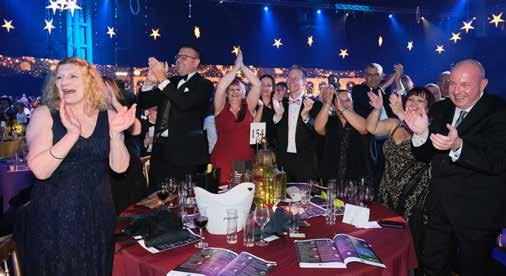
Evie Barrett (Jacobs) with Ian MacLaren of GTR.
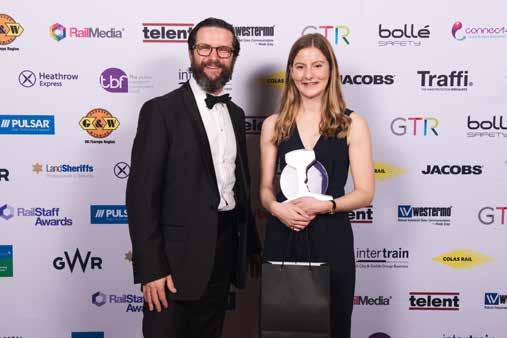
In a short time, Ian has built up a great reputation with supervisors, trade union representatives, stations team and drivers and guards to ensure the depot runs smoothly.
Managing projects
Another ‘train man’ won the Project Manager category. Richard Vernon joined Hull Trains as a graduate in February 2016. Over the last three years, he has worked to bring Hull Trains’ £60 million investment in new rolling stock to life. His committed, resilient and focused attitude, while working collaboratively with Hitachi Rail’s team, has resulted in the introduction of Hull Trains’ new ‘Paragon’ fleet being one of the few rolling stock projects in the UK to be delivered to schedule and on time.
Richard was the primary interface between Hull Trains, fleet owners Angel Trains, manufacturer Hitachi and other key partners such as Network Rail. His work involved regular visits to Hitachi factories in Kasado, Japan, and Pistoia, Italy, as part of quality checks.
It is through those continual checks that Hull Trains has been able to sign off the trains at each stage to the schedules determined in the contract. Considering the issues with its existing fleet - including mechanical failures and an onboard fire - delivering these new trains on time has been even more important for customers. In addition to his instrumental work on the Paragon fleet, Richard has also led smaller projects, such as the introduction of an on-train passenger information screen to improve accessibility, installation

of a driver advisory system and the introduction of on-train Wi-Fi.
On the night of the RailStaff Awards, Richard said: “It means a lot to receive this award and I’m really grateful to have been given the opportunity to work on such a key project for Hull Trains.
“Managing this project gave me the opportunity to travel to Japan and Italy, as well as improving my understanding of design reviews, contract specifications and the train production and manufacturing process. I enjoyed learning about the train’s design, refining the train interiors and working with Hitachi Rail and Angel Trains to bring the vision to life for our staff and customers.
“It was a compliment to be given such a big project but it’s one I’m really pleased to have led.”
PTM Design, specialists in rail and fleet livery, vehicle wrapping, wayfinding information systems and interior installations, sponsored the category. Ajmal Akram, head of business development, said: “There were a lot of good entries in the category but, knowing that, of the rail operators, Hull is quite a small operation, this entry stood out for having someone take on the challenge of the
Rail Engineer | Issue 181 | Jan/Feb 2020 implementation of the train.”
Cate Lough of Colas Rail is currently in charge of the overhead line and HS2 enabling works within the South Rail Systems Alliance. This included the delivery of £27 million worth of multidisciplinary work at Euston station in the last month alone. As a result, she was highly commended for her work.
Also highly commended was signalling programme manager Neil Workman of Network Rail. He manages a team of over 50, delivering a portfolio of work valued at £300 million. His hands-on attitude, and his willingness to step in and do the work himself if needed, appealed to the judges and earned him his commendation.
Graduate
A graduate geologist based in Leeds won the Graduate of the Year award, sponsored by Govia Thameslink Railway (GTR).
Evie Barrett works for Jacobs, supporting the construction of a multibillion-pound high-speed railway in California.
She is a member of Jacobs’ tunnelling and ground engineering (TGE) unit and, from the other side of the globe, has been a key player in developing the geotechnical database needed to allow construction to go ahead. As “a single source of truth”, this database has vastly improved efficiencies and quality on the project.
Evie was part of the team that took ownership of a project to deliver geotechnical engineering data reports in
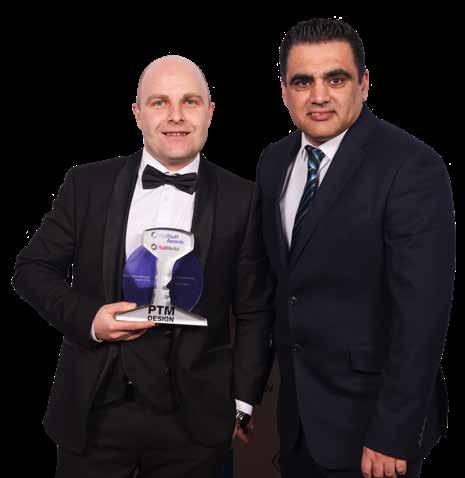
2018. She then took the significant step up to lead the delivery of geotechnical baseline reports - a move that saw her work above her grade. As a result, she is now responsible for liaising with the Jacobs teams in the USA and managing four teams of engineers in England, Scotland and Poland to ensure the consistent delivery of these reports.
One nomination for Evie read: “She has demonstrated great maturity, composure and technical ability to ensure that the reports are being delivered on time and to a high standard.”
Evie has also worked on other rail schemes, such as the Transpennine Route Upgrade, Calder Valley Journey Time Improvement and the West Ruislip Northolt Corridor projects, since joining Jacobs in 2015.
Her enthusiasm for geology has also seen Evie return to the University of Leeds, where she completed bachelor’s and master’s degrees in the subject, to mentor post-graduates. At present she is also leading the production of a Jacobs TGE work experience booklet, to ensure students benefit from their time with the company.
Ian McLaren, chief financial officer at category sponsor GTR, said: “It’s really important to recognise young people coming up through the organisation. We’re a massive industry and we’ve got to show progression for people new to the sector and show they can actually achieve amazing things at such a young age.” Miraan Jothinath of Network Rail was highly commended for his work on two high-profile projects: DICE and Fast Trackers 2019. He and a partner co-founded the DICE competition to encourage and support graduates and apprentices to develop digital solutions to problems that they’d encountered while on their respective training schemes. He also chaired the steering group of the Fast Trackers 2019 programme, which encourages 16 to 19-year-old students to think about a career in engineering.
Aisha Mughal joined Colas Rail in 2018 as a commercial assistant working in one of the most dynamic areas of the S&C South Alliance - Euston enabling works. She worked closely with the commercial manager to develop her commercial, contractual and procurement understanding. Through this, Aisha was able to bring her own logic, organisational skills and initiative to simplify timesheet approvals, invoice processes, application for payment, final accounting and supplier management. It impressed the judges who gave Aisha a ‘highly commended’ certificate for her efforts.


And there’s more...
There were, of course, many other awards presented on the night. While they may not be directly engineering-related, they reflect the wide range of skills that make the railway work and the enthusiasm that holds it all together. Apprentice of the year went to Zoe Auld of Virgin Trains. Southeastern station manager Margaret Capps won Customer Service, Aaron Koduah of Virgin Trains lifted the Station Staff award..
The Award for Charity was won by Network Rail’s Chris Conway, for his work with the homeless in Blackpool, and Samaritans’ Lifesaver Award went to John Dawson and Rob Shannon of Land Sheriffs, who had done just that at St Pancras. McGinley’s safety team won Safety.
David Rees of WSP was judged to be the HR person of the year, Network Rail’s ‘Big Plan’ team won Recruitment and Jaye Dry of Freightliner - now G&W UK - won Marketing and Communications.
Rail Manager of the Year was Kevin Tarrier of Heathrow Rail, the Rail Team was ‘Scotrail in the Community’ and GWR’s Pete While was Rail Person of the Year.
Finally, Jed Mason of recruitment and labour supply company Morson was recognised for the 33 years he has spent building up a group with a turnover of over £1 billion a year. He received an OBE in 2016 and the RailStaff Lifetime Achievement Award in 2019, both well deserved.
It was a great night. Well done the Rail Events team for putting it on, congratulations to the other sponsors not mentioned here - Jacobs, GWR, Connect 4, Intertrain, Heathrow Express, Matchtech, Land Sheriffs, Samaritans, RailwayPeople.com, Total Rail Solutions, Bollé and the Transport Benevolent Fund - and finally thank you for coming to the 1,000 people who were there on the night.
See you in 2020!
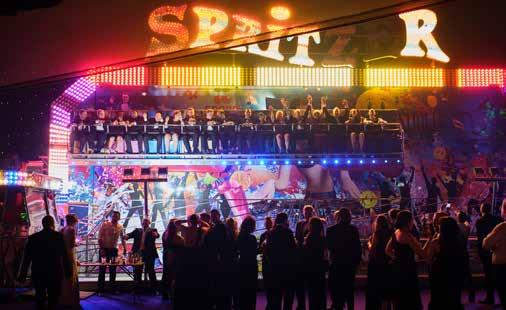

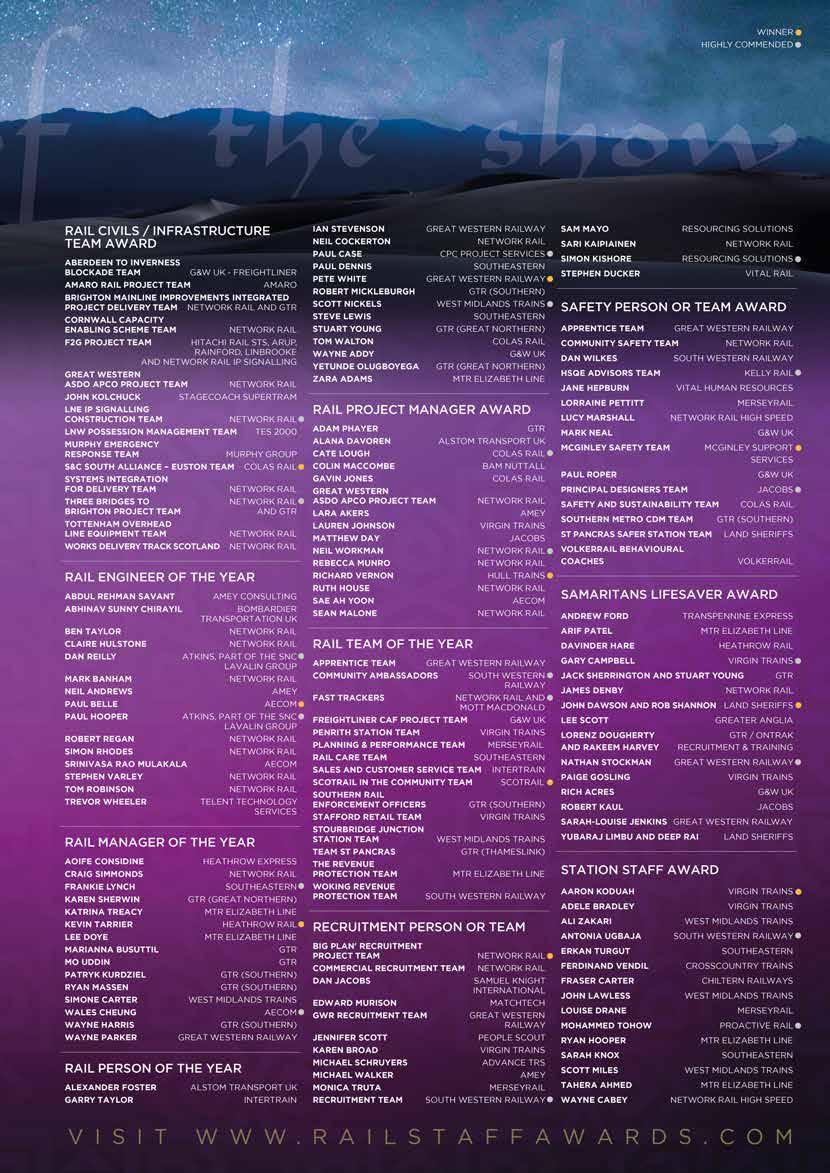
RAIL PARTNERSHIP AWARDS www.railpartnershipawards.com/nominate ENTER THESE CATEGORIES TODAY 2018 201 Best Collaboration Medium-sized SME of the Year Regional Partner of the Year – Southern NETWORK RAIL PARTNERSHIP AWARDS 2017
Best Innovation
Best Project Putting Passengers First Regional Partner of the Year – Wales and Western
Regional Partner of the Year – Eastern Safety
Contribution to Railway Heritage
Driving Efficiencies
Investing in People Regional Partner of the Year – North West and Central Small/Micro SME of the Year
Regional Partner of the Year –Scotland’s Railways Regional Award for Exceptional Community Engagement Sustainable Excellence










